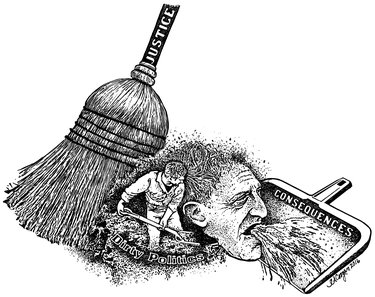There must be consequences to dirty politics
Dirty politics: We’re all sick of it. So we commend Warren Redlich for actually doing something about it. Last week, a New York Supreme Court judge ruled that Redlich’s case, claiming political defamation, can go to trial.
The gubernatorial campaign season here in New York in 2010 was as nasty as the current presidential campaign. Republican Carl Paladino flooded our virtual and postal boxes with outrageous mail, and our answering machines were filled with political spin.
The dirtiest message of all, though, was aimed not at the incumbent Democratic governor, Andrew Cuomo, but rather at the Libertarian candidate, Warren Redlich. A mailer labeled Redlich as a sexual predator, calling him a “sick twisted pervert.” The flyer pictured him, gave his home address in Guilderland, and concluded with a series of repeated capital-letter demands to “Call the police!” If Redlich is seen “near a public school”: “Call the police!”; if Redlich is seen “in your neighborhood”: “Call the police!”; or if Redlich is seen “near your family”: “Call the police!”
Redlich, a Guilderland High School and Albany Law School graduate, has never been arrested or charged with any sex crime.
The week before the election, the flyer was mailed to 150,000 households across the state, including his mother’s in Guilderland.
We ran a letter to the editor at the time from his wife, Heather Redlich, describing the Redlichs’ actual lifestyle — running a small law practice together and raising their two young daughters in suburban Guilderland. “We teach our children to be kind to others,” she wrote. “We try to make the world a better place by volunteering and getting involved with our community.”
She also wrote of the anxiety and heartache she suffered because of the “terrible lies” in the flyer. “You have hurt me and my family…You have made me fear for the safety of my children in our own home,” she wrote.
The answering machine in our newsroom that week was filled with messages from people expressing their outrage and disgust over the flyer and urging us to do something about it.
“This is the sickest thing I’ve ever seen,” said a woman from New Scotland. “How can they get away with this?”
“It’s a filthy, filthy flyer,” said a man from Guilderland. “You have to find out who did this.”
Some people came to the news office with their copies of the flyer since describing it wasn’t enough.
We ran a front-page story on the issue. Small print on the flyer identified its sender, as required by law: “People for a Safe New York.” But the group wasn’t registered with the New York State Board of Elections as required for more than $1,000 in campaign spending. If a formal complaint is filed, the board will investigate. But the penalty is a mere $500.
As we wrote in this space at the time, the penalty provides no deterrent. We called then and we now renew the call for stronger penalties.
Redlich said at the time, “I don’t think filing a claim with the Board of Elections would have any meaning.” He added, “I don’t want to talk about filing a suit.” He sent a notice to the media not to cover the flyer story because that would “reward the criminals.”
He also told us, “The mailer was very painful for my family. It was very hurtful. It’s very clear the purpose was personal; they were trying to hurt me, my wife, and my children, and they succeeded.”
He vowed, because of it, that he would never run for political office again — and he hasn’t. He had been elected to the Guilderland Town Board in 2007 — an upset in a Democrat-dominated town. He served ably, with much energy, providing a counterpoint to Democrats on important issues.
Over the years, Redlich had made several quixotic runs for higher office, not because he expected to win but because he cared enough about issues to take a stand. He ran for Congress in 2004 and again in 2006 on the Republican line against an entrenched Democratic incumbent.
Motivated in part by research he had done for his senior thesis, at Rice University in Texas, which was a cost-benefit analysis of the United States’ defense in Western Europe, Redlich ran his 2004 campaign using the tagline, “Stop wasting money overseas.” He got roughly 30 percent of the vote.
Similarly, in 2010, he didn’t expect to win as governor. He accepted the Libertarian slot because he believed third-party candidates play on important role. “They can change the focus of a debate, and change the nature of a discussion,” Redlich said at the time. “They can inject new issues, and, if they get media attention, they can make mainstream candidates answer questions.”
His goal was to garner the 50,000 votes needed to put the Liberterian Party permanently on the ballot; he fell short with about 45,000 — still the most votes the Libertarians have received in a New York State gubernatorial election.
In short, Redlich was someone who cared about and invested himself in the political process. His not running again, we wrote in this space in 2010, was “a failure for us all.”
We went on, “We hope Redlich seeks legal remedy. The problem is larger than one man’s suffering or one family’s fears. We need a system where political discourse focuses on issues, not smears, and where civil disagreement — with candidates putting their names behind their views (as Redlich always has) — leads to shared solutions.”
Redlich did, indeed, decide to sue for defamation. He is representing himself in the case. He is up against two big law firms.
On April 21, New York State Supreme Court Justice Richard Braun ruled that Redlich’s defamation claim against Carl Paladino, Roger Stone, and Michael Caputo can go to trial.
Caputo was Paladino’s campaign manager in 2010 and Roger Stone was an advisor whom the judge described as “a well-known political operative.”
Stone has most recently worked for Donald Trump, and is probably best known for his role in Richard Nixon’s election, using such tactics as making a contribution to the Young Socialist Alliance in the name of a Nixon rival and giving the receipt to the Manchester Union-Leader, or planting a driver for Hubert Humphrey who would actually report back to the Nixon campaign.
The lawyers who sought to have the defamation case dismissed say their clients did not produce the flyer. The Enterprise last week asked one of the lawyers — Jason Ulatowski, a partner in the firm of Rupp Baase Pfalzgraf Cunningham, representing Caputo — how he felt about the contents of the flyer apart from any role his client may have had in producing it.
“I do not condone it or think any of it is appropriate,” he said. Asked if such tactics hadn’t been a hallmark of Stone, Ulatowski responded that such a broad question was not relevant. “Any prior actions of Mr. Caputo or Mr. Stone are not relevant,” he said. “It does not mean that they did what he is alleging.”
So both sides agree that the flyer was bad. Redlich said he pursued the suit because he hopes “to hold them accountable for what they do.”
If Redlich were to win substantial funds from the suit, he said, he would like to establish a not-for-profit group that “tracks the evil consultants and notifies local media.”
Redlich said there are good and bad consultants. “Roger Stone is very skilled, but he is evil,” Redlich said. Candidates must be held responsible for what their consultants do.
We’re pleased Judge Braun has allowed the case to proceed. His decision begins with these words: “Politics is too often a ‘dirty business.’”
If Redlich wins, that may send a message to those who manufacture the dirt. And beyond that, if he were to spend his winnings as he has proposed, society at large would be served.
“There are bad people in politics,” Redlich told us. “They can’t compete with good people on a level playing field. The rotten people survive because they throw mud at the good people. It drives them out.”
We urge the good people, no matter their political party, to stand strong and not let the dirt bury them. Redlich’s suit is a step toward stopping such defamation.
— Melissa Hale-Spencer



